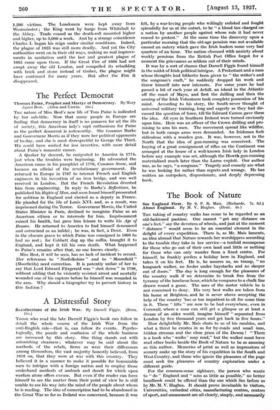The Perfect Democrat
Thomas Paine, Prophet and Martyr of Democracy. By Mary Agnes Best. (Allen and Unwin. 16s.) Tan nature of Miss Best's new life of Tom Paine is indicated by her sub-title. Now that many people in Europe are finding that democracy in itself is no panacea for all the ills of society, this American lady's rapt enthusiasm for Paine as the perfect democrat is noteworthy. She trounces Burke and Gouverneur Morris as if they were her political opponents of to-day, and she is most disrespectful to George the Third. We could have wished for less invective, with more detail about Paine's romantic career.
A Quaker by descent, he emigrated to America in 1774, just when the troubles were beginning. He advocated the American cause in his pamphlet of 1776, Common Sense, and became an official of the revolutionary government. He returned to Europe in 1787 to interest French and English engineers in his invention of an iron bridge, and was well received in London. But the French Revolution diverted him from engineering. In reply to Burke's Reflections, he published his Rights of Man, and soon found himself prosecuted for sedition in England and elected as a deputy in France. He pleaded for the life of Louis XVI. and, as a result, was imprisoned during the Terror. Gouverneur Morris, the United States Minister in Paris, declined to recognize Paine as an American citizen or to intercede for him. Imprisonment ruined his health, but gave him leisure to write his Age of Reason. He returned to America to find himself denounced and ostracized as an infidel ; he was, in fact, a Deist. Even in the obscure grave to which Paine was consigned in 1809 he had no rest ; for Cobbett dug up the coffin, brought it to England, and kept it till his own death. What happened to Paine's remains after that, no one knows clearly.
Miss Best, it will be seen, has no lack of incident to record. Her references to " Norfolkshire " and to Moorsfield " (Moorfields) need correction. It is patently unfair of her to say that Lord Edward Fitzgerald was " shot down " in 1798, without adding that he violently resisted arrest and mortally wounded one of his captors before he himself was wounded in the arm. Why should a biographer try to pervert history in this fashion ?






























 Previous page
Previous page